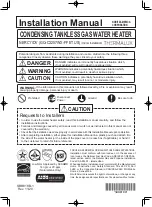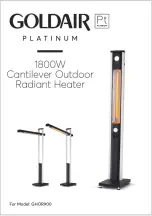
mrcool.com
13
Venting the Water Heater - Overview
Venting the Water Heater
30
The water heater must be properly vented to ensure a constant supply of clean intake air and to
ensure that exhaust air is properly removed from living areas. When venting the water heater,
follow these guidelines:
DO NOT
i
nstall the water heater in areas with contaminated air (high levels of sawdust, dust,
sand, flour, aerosols, or any other airborne contaminants), as this could cause the unit to
have operational issues. Damage that is caused as a result of the unit being operated and
installed in an area with contaminated air
WILL NOT
be covered by the warranty. If you must
install the water heater in an area with contaminated air, use direct venting to supply air
from outside of the building. It is recommended that regular intervals of maintenance and
filter cleaning be performed when installed in these areas.
DO NOT
connect the water heater vent to a vent for any other gas water heater or vent stack.
DO NOT
obstruct heater air intake or exhaust. Support all vent piping per manufacturer’s
installation instructions.
DO NOT
place chemical vapor emitting products near the unit.
DO NOT
operate the heater unless it is vented to the outdoors.
Install the water heater as close as possible to the vent termination.
For horizontal runs, slope the horizontal section upward toward the vent termination at a
rate of 1/4 in. per foot (2% slope).
Create an airtight seal at each joint in the exhaust and intake air pipes from the water heater
collar to the vent termination connecting the pipe to the vent collar.
Analyze the entire vent system to make sure that condensate will become trapped in a
section of vent pipe and reduce the open cross-sectional area of the vent.
According to NFPA 720, carbon monoxide detectors should be installed outside each sleeping
area.
WARNING
This appliance is certified as a “Category IV” appliance and requires a special venting system. The
vent system will operate with a positive pressure in the pipe. Exhaust gases must be piped directly
outdoors using the vent materials and rules outlined in these instructions. Follow the venting
instructions carefully. Failure to follow these instructions will result in substantial property
damage, severe personal injury, or death.
DO NOT
connect vent connectors serving appliances vented by natural draft into any portion
of mechanical draft systems operating under positive pressure.
• Improper venting of the water heater can result in excessive levels of carbon monoxide, which
can lead to severe personal injury or death. This water heater must be vented in accordance
with the “Venting of Equipment” section of the latest edition of the ANSI Z223.1/NFPA 54
Natural Fuel Gas Code in the USA and/or the “Venting Systems and Air Supply for Water
Heaters” section of the latest version of the CAN/CGA B149.1 Natural Gas & Propane
Installation Code in Canada, as well as all applicable local building codes and regulations.
Follow all instructions and guidelines when venting the water heater. Installation of a venting
system should ONLY be performed by a licensed professional.
• The venting system must be sealed airtight to prevent flue gas spillage and carbon monoxide
emissions, which will result in severe personal injury or death.
• The building owner is responsible for keeping the air intake and exhaust termination free of
snow, ice, or other potential obstructions, as well as scheduling routine maintenance. Blocked
or obstructed vent piping terminations could result in property damage, severe personal
injury, or death.
•
•
•
•
•
















































